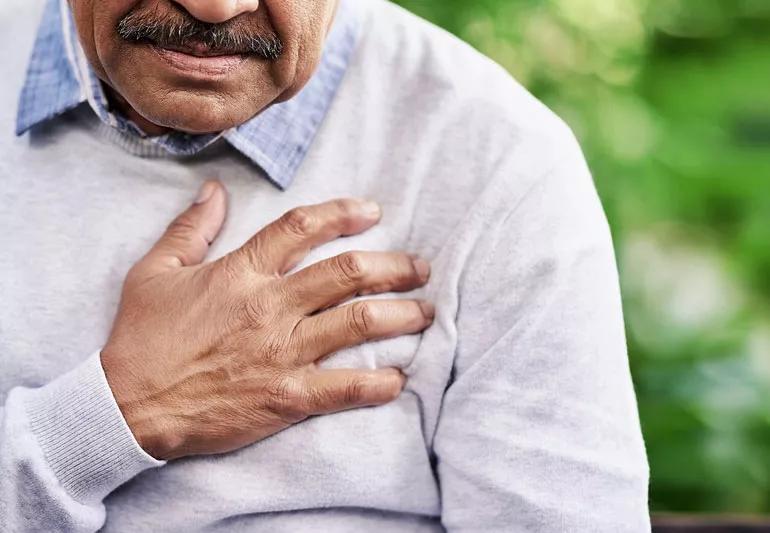Knowing the difference may not be as easy as you think

Image content: This image is available to view online.
View image online (https://assets.clevelandclinic.org/transform/ec430698-eede-49f5-b947-305e3d2d3fd4/manChestPain-1031919650-770x533-1_jpg)
Man suffering with chest pain
The main symptoms of a heart attack and heartburn sometimes are nearly indistinguishable, says cardiovascular medicine specialist Mouin Abdallah, MD. Sometimes medical testing is necessary to determine what’s going on, he says.
Advertisement
Cleveland Clinic is a non-profit academic medical center. Advertising on our site helps support our mission. We do not endorse non-Cleveland Clinic products or services. Policy
One clue that it might be a heart attack is if your chest pain is accompanied by shortness of breath or sweating. If the chest pain persists after you take an over-the-counter heartburn remedy, Dr. Abdallah recommends seeking medical attention right away.
“The worst thing you can do is ignore your symptoms and think they will just disappear,” he says. “The best thing to do is call 911 and get checked by a medical professional to help prevent long-term health effects.”
He also suggests taking an aspirin if there are delays in getting to professional medical care. Aspirin helps to thin the blood in case you are having a heart attack.
When you have a heart attack, it’s because one of the coronary arteries that provide blood to the heart is blocked. The blockage obstructs the flow of blood and oxygen to the heart.
When you think of a heart attack, you may picture a person clutching their chest and collapsing from sudden, severe pain. But the symptoms of a heart attack often are much more subtle. This is especially true for women, Dr. Abdallah says.
A study by researchers at the University of British Columbia showed women are slightly less likely than men to experience chest pain during a heart attack.
Advertisement
Instead, they often suffer from subtle symptoms such as:
People with diabetes who are having a heart attack often have atypical or minimal symptoms, Dr. Abdallah says. If you have diabetes, you should seek medical attention for even slight chest or stomach pain or discomfort.
While its name suggests otherwise, heartburn has no impact on your heart.
Heartburn, or acid indigestion, happens when your stomach acid flows back into your esophagus. It causes an uncomfortable burning feeling or pain in your chest that can move up to your neck and throat.
The esophagus is located close to the heart, so it’s often difficult for people to distinguish where the pain is coming from, Dr. Abdallah says.
This is why it’s important for a doctor to rule out a heart attack if over-the-counter antacids don’t work or if you experience the less pronounced symptoms, he says.
If left untreated, heartburn can cause more serious problems such as inflammation and narrowing of the esophagus, respiratory problems, chronic cough — or even cancer.
The good news: Several types of over-the-counter medicines are available to treat heartburn.
Advertisement

Sign up for our Health Essentials emails for expert guidance on nutrition, fitness, sleep, skin care and more.
Learn more about our editorial process.
Advertisement
The stress of a high-stakes game can trigger a heart attack in people who are at high risk
Inflammation caused by the influenza virus can lead to deadly heart complications
Dramatic chest pain isn't always one of the clues
The warning signs of trouble and how to prevent it
The short answer from an interventional cardiologist
Nontraditional markers help doctors pinpoint who needs aggressive treatment
There’s no way to stop it once a heart attack is happening, but the most important thing you can do is to call for help
Your natural estrogen levels support a healthy heart by improving your cholesterol, increasing blood flow and reducing free radicals
Type 2 diabetes isn’t inevitable with these dietary changes
Applying a hot or cold compress can help with pain
Pump up your iron intake with foods like tuna, tofu and turkey